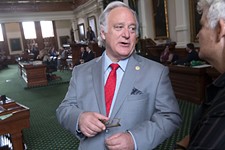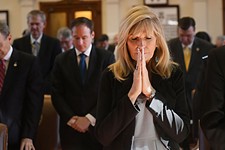Naked City
Dems Force Republicans' Gambling Hand
By Amy Smith, Fri., April 8, 2005
"The Republicans created a shortfall, and now they want gambling to make up the difference," Democratic caucus leader Rep. Jim Dunnam pointed out at a March 30 press briefing. The next day, on a warm, cloudless morning, Democrats effectively hijacked an anti-gambling rally at the Capitol, which the state GOP had helped organize and publicize. The event drew a small sign-waving crowd that looked to be more closely aligned with archconservative Rep. Robert Talton, R-Pasadena, than, say, the blue-jean clad Dunnam from Waco. Both offered a few remarks, but the silver-haired Talton, looking more like an evangelical preacher than a legislator, won the loudest applause and calls of "Amen!" from the audience. Legislators spoke cheerfully about bipartisanship as they took turns at the microphone, but it was clear the Democrats had stolen the show.
"It's definitely going to slow things down," Bill Stinson, president of Let the Voters Decide, said of the Dems' political maneuver. Stinson's pro-casino lobby group wants legislation that would put a constitutional amendment on the November ballot to expand gambling beyond what already exists. "We already know that people want casino gaming, because the [2003] Texas Poll showed that one out of three Texans go to out-of-state casinos." Millions of Texans spend billions of dollars each year at gaming spots in New Mexico, Oklahoma, and Louisiana, according to the poll.
Still, with Democrats teaming up with Republican moralists against gambling, the minority party has forced its way into the driver's seat – just in time for this week's budget debate, and possibly some productive bargaining. It also helps that proposed constitutional amendments like this one require 100 votes in the House. "Republicans need [Democrats] to bring at least 50 votes to the table," said Kelly Fero, a state Democratic Party strategist. "To accomplish this, Republicans will have to deal." Ideally, that deal-making would include a full restoration of cuts made in 2003 to children's health insurance and mental health benefits, a rollback on homeowners' insurance rates, and a return to regulating college tuition rates, among other issues impacted by the proposed $139 billion budget.
Of course, the session is still young. Stinson, for one, isn't yet willing to throw in the towel on the casino question. For that matter, neither are Democrats.
Got something to say on the subject? Send a letter to the editor.










